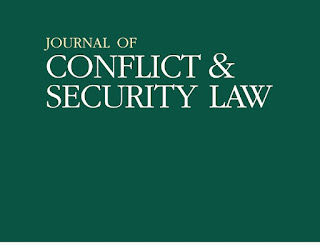Norms can be adopted without modifications or adapted to regional contexts for strategic or principled reasons. Norm adoption and adaptation can also happen by chance.
When adoption takes place without consideration of the norm’s effectiveness or appropriateness, we speak about imitation. When adaptation takes place in such a manner, we lack conceptual tools to analyze it.
“We propose a novel concept of incidental adaptation – divergence between promoted and adopted norms due to fortuitous events,” KSENIYA OKSAMYTNA and NINA WILÉN write in Third World Quarterly. “This completes the typology of scenarios leading to norm adoption and adaptation,” they write in their article titled ‘Adoption, adaptation or chance? Inter-organizational diffusion of the protection of civilians norm from the UN to the African Union.’
OKSAMYTNA and WILÉN apply the typology to the transmission of the protection of civilians norm in peace operations from the United Nations (UN) to the African Union (AU). The AU adopted the UN’s approaches in pursuit of interoperability and resources, and out of recognition of the UN’s normative authority.
It also happened incidentally when the AU temporarily followed the UN’s approaches. The AU engaged in adaptation to reflect the nature of its operations and normative orientations of AU member states.
Incidental adaptation accounted for the presence of the rights-based tier in the AU’s protection of civilians concept.
When adoption takes place without consideration of the norm’s effectiveness or appropriateness, we speak about imitation. When adaptation takes place in such a manner, we lack conceptual tools to analyze it.
“We propose a novel concept of incidental adaptation – divergence between promoted and adopted norms due to fortuitous events,” KSENIYA OKSAMYTNA and NINA WILÉN write in Third World Quarterly. “This completes the typology of scenarios leading to norm adoption and adaptation,” they write in their article titled ‘Adoption, adaptation or chance? Inter-organizational diffusion of the protection of civilians norm from the UN to the African Union.’
OKSAMYTNA and WILÉN apply the typology to the transmission of the protection of civilians norm in peace operations from the United Nations (UN) to the African Union (AU). The AU adopted the UN’s approaches in pursuit of interoperability and resources, and out of recognition of the UN’s normative authority.
It also happened incidentally when the AU temporarily followed the UN’s approaches. The AU engaged in adaptation to reflect the nature of its operations and normative orientations of AU member states.
Incidental adaptation accounted for the presence of the rights-based tier in the AU’s protection of civilians concept.
“These findings nuance our understanding of norm diffusion, inter-organizational relations and the role of chance in international affairs.”
Kseniya Oksamytna & Nina Wilén (2022) Adoption, adaptation or chance? Inter-organisational diffusion of the protection of civilians norm from the UN to the African Union, Third World Quarterly, 43:10, 2357-2374, DOI: 10.1080/01436597.2022.2102474






